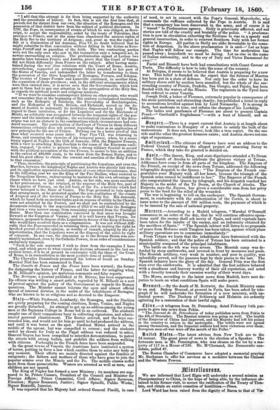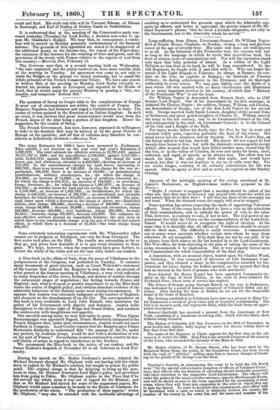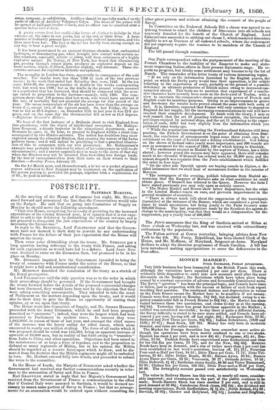ZiortlIgutuno.
We are informed that Lord Elgin will undertake a second mission as Plenipotentiary to China, in the hope of being able, by the influence ob- tained in his former visit, to secure the ratification of the Treaty of Tien- tsin, and obtain an entire cessation of hostilities.—Times.
Lord. Ward has been raised from the dignity of Baron to that of Via-
count and Earl. His style and title will be Viscount Einem of Einem in Roxburgh, and Earl of Dudley of Dudley Castle in Staffordshire.
It is understood that at the meeting of the Conservative party con- vened yesterday [Tuesday] by Lord Derby, a decision was come to op- pose Mr. Gladstone's Budget. We hear that, in consequence, a resolu- tion will be moved on Monday generally condemnatory of the financial scheme. The grounds of this opposition are stated to be disapproval of the additional penny on the Income-tax, the repeal of the Paper-duty, the extension of the licenses for the retailing of wine and spirits, and the provisions of the treaty with France relative to the exports of coal from this country.—Morning Post, February 16.
The Scotsman says that, at a second meeting held on Wednesday, "the tone employed, and the policy resolved on, were more warlike than at the meeting on Tuesday. An agreement was come to, not only to resist the Budget on the ground we stated yesterday, but to assail the whole principle of the French Commercial Treaty. We have also reason to believe that, at the meeting on Monday, Lord Derby virtually re- tracted his promise made at Liverpool, and repeated in the House of Lord, that he would assist the present Ministry in passing a fair, rea- sonable, and temperate' Reform Bill."
The question of Savoy no longer adds to the complications of Europe It arose out of circumstances not within the control of France. The Emperor Napoleon had foreseen and urged a Confederation in Italy. The course of events pointed in the direction of an Italian kingdom. In such an event, it was obvious that great inconvenience would arise from the French slopes of the Alps being a portion of that kingdom. Hence the suggestion for the cession of Savoy.
The French Government, has now, however, expressed its willingness to defer to the decision that may be arrived at by the great Powers of Europe on the question; and all fear of collision may therefore be con- sidered as definitively obviated.—Morning Post.
The Army Estimates for 1860-1 have been presented to Parliament. They exhibit a net increase on the year over last year's Estimates of 1,982,9781. The total estimate for effective services is 12,707,6521. against 10,711,792 in 1869; and for non-effective 2,134,6231. against 2,147,505— total, 14,842,2751. against 12,859,2971. last year. The charge for land forces, pay, and allowances, amounts to 4,499,6361., showing an increase of 775,162/. In the miscellaneous charges for land forces, amounting to 698,7921., there is an increase of 136,4231. In the charge for the war de- partments, 196,2241. there is an increase of 10,630/. ; on manufacturing establishments, military storekeepers, &a., for which the charge is 374,0051., an increase of 14,965/. ; on wages of artificers, labourers, &c., for which the charge is 944,3711., an ,increase of 194,843/. ; on provisions,
'
forage furniture, Sic., for which the charge is 1,281,0771., an increase of 184,2931.; on warlike stores for land and sea service, for which the charge is 2,168,3881., an increase of 1,020,763/. ; on fortifications, for which the charge is 645,3551., an increase of 196,783/. ; on educational and scientific branches, for which the charge is 275,6971., an increase of 53401. The prin- cipal items upon which a decrease in the charge is shown are—Embodied militia, total charge 300,0001., showing a decrease of 260,000/. ; volunteer corps, charge 68,0001. ; decrease 20,000/. ; clothing and necessaries, charge 342,0001., decrease 108,000/. ; civil buildings, charge 206,5001., decrease 29,457/. ; barracks, charge 707,6071., decrease 125,8851. The estimates for non-effective services present no remarkable features ; the only item in which there is any considerable change is in the pay of reduced and retired offices, in which there is a decrease of 13,3451.—the total charge being 492,3571.
Some extremely interesting experiments with Mr. Whitworth's rifled cannon are in progress at Southport, not very far from Liverpool. The first series took place on the 16th. The results are astounding so far as they go, and prove how desirable it is to pay every attention to these guns. We hope' however, when the experiments have gone further, to review the whole of the trials and set the case fully before our readers.
A Blue-book on the affairs of Italy, from the peace of Villafranca to the postponement of the Congress, was published on Tuesday. It contains many documents of great interest, such as Count Walewski's statement of the reasons that induced the Emperor to stop the war; an account of what passed at the famous meeting at Villafranca ; a very vivid reflection in many despatches of the views, feelings, and desires of Austria through the subsequent stages of negotiation; her feeling towards France and England ; and, what is of equal or greater importance to us, the Blue-book traces the course of English ;policy, and contains abundant evidence of the admirable behaviour of the Italians under most trying circumstances. It appears that Austria was extremely indignant at the conduct of England, and eloquent on the abandonment of an old ally. The correspondence on this head is very creditable to Lord John Russell, who maintains the policy of his Government with dignity and firmness. Austria holds throughout to the divine right of Kings and Grand Dukes, and conducts the controversy with haughtiness and asperity.
One anecdote among many we may find space to quote. When Signor Buoncompagni was appointed Regent, Prince Metternich intimated to the French Emperor that, under such circumstances, Austria would not meet Sardinia in Congress. Lord Cowley reports that the Emperor gave Prince Metternich distinctly to understand that " the passage of the Po, under any pretext, bi,itunaGetrian troops, would be met with a declaration of war on the part of France." Nevertheless Austria continued to reserve to her- self liberty of action in regard to interference in the Duchies.
We recommend the Blue-book to the notice of our readers, and Sir James Hudson's despatch of December 25 to all believers in Lord Nor- manby.
During his speech on Mr. Bailie Cochrane's motion, Admiral Sir Michael Seymour charged Mr. Oliphant with not having told the whole story in regard to Sir Michael's conduct, but sought to poison the public mind. The original charge is that by delaying to bring up the gun- boats in time, Sir Michael frustrated Lord Elgin's policy and prevented him from going to Pekin. Mr. Oliphant replies in the Times that if he did not tell the whole story it was out of regard for Sir Michael ; and that as Sir Michael hid moved for some of the suppressed papers, Mr. Oliphant would cause a motion to be made in the House of Commons for the production of the whole. " The production of these papers," writes Mr. Oliphant, " may also be attended with the incidental advantage of enabling us to understand the grounds upon which the Admiralty sup- ports its officers, and better to appreciate the precise import of Sir Mi- chael Seymour's phrase, i that he owed a [certain allegiance, not only to the Government, but to the Admiralty whom he served.'
Long suffering from illness, Lieutenant-General Sir William Napier died at Scinde House, Clapham, on Sunday, closing a long and glorious career at the age of seventy-four. His name and fame are well-known to us all. As the historian of the Peninsular war, his renown will last as long as the language in which he wrote that marvellous book, the fruit of sixteen years of conscientious toil. Nor will his reputation stand only hpon that lofty pedestal of letters. As a soldier of the Light Division no less than as its bard, he will be long remembered. In the 43d Regiment, he fought with it and bled with it. Who can forget the march of the Light Brigade to Talavera ; its charge at Busaco; its con- duct on the Coa ; its exploits at Badajoz • its fortitude at Fuentes d'Onoro ; its daring achievements in the iyrenees; and its thorough soldiership in every action. We may pass lightly over the faults of a man whose life was marked with so many excellencies and illustrated by so many important services to his country, of which that " History of the Peninsular War" is not the least.
Sir William Napier is descended from Francis Scott, who in 1707 became Lord Napier. One of his descendants by his first marriage, is Admiral Sir Charles Napier ; the soldiers, George, William, and Charles, are descendants of George, son of the first Lord Napier by his second wife. George married Lady Sarah Lennox, daughter of the second Duke of Richmond, and great grand-daughter of Charles II. William entered the army in the last century, rose to be Lieutenant-Colonel of the 43d, and subsequently to the rank of. Lieutenant-General ; to be the Colonel of the 22d, and a Knight of the Bath. For many weeks before his death, says the Post, he lay in acute and constant bodily pain, expecting patiently the hour of his release. His mind never lost its clearness and its freedom. On New Year's Day, an old friend called to bid him farewell. His doctor did not expect he had twenty-four hours to live ; but with the obstinate, unmanageable energy which, after wounds that would have killed another mao, roused him by the Coa, or in the valley of Coimbra, he rose and spoke for hours, clear, collected, and rapid of speech, as he always was. The effort was too much for him. He only slept little that night, and would have seemed, but that it was too hopeless to say so, to rally next day. For six weeks longer, contrary to all ordinary Calculations, his life was spared. After an agony so slow and so acute, he expired on last Sunday evening.
Apropos of the midnight meeting of the erring sisterhood at St. James's Restaurant, an Englishwoman makes the proposal in the Times- " Might I venture to sugggeat that a meeting should be called of the other sex, that they maybe lectured and prayed with about the awful sin and misery that lie at their door ? I will bear my share of the necessary tea and toast. When the demand ceases the supply will soon be stopped."
Some question has arisen respecting the mode of appointing Volunteer officers. Some of the corps have desired to have a veto on the selections of their commandants, and to embody the power of veto in the rules. This, however, is contrary to rule, if not to law. The real power of ap- pointment lies with the Crown on the recommendation of the Lord-Lieu- tenant. It would never do to recognize the right of election. At the same time it is desirable that all officers of Volunteers should be accept- able to their men. The difficulty is easily overcome. A commandant can in many ways ascertain whether certain men whom he may deem otherwise fit are acceptable. If he finds they are not he can !fill, if he so please, keep their names on the list handed in to the Lord-Lieutenant. The War-office, far from objecting to the plan of taking the sense of the corps, recommends it by implication. But it very properly leaves upon the Commandant the whole responsibility of the final step.
A deputation, with an unusual object, waited upon Sir Charles Wood, on Saturday. It was composed of directors of Life Insurance Com- panies, and they claimed a share in the compensation awarded by Go- vernment for losses during the Indian mutiny, on the ground that they had an interest in the lives of persons who were murdered !
Bear-Admiral Sir Henry Keppel has been appointed Commander-in- chief on the Cape of Good Station, in the room of Rear-Admiral Sir Frederick Grey, whose term of service has expired.
The Prince of Orange going through Bristol, on his way to Badminton, was welcomed by a guard of honour, composed of Volunteer Rifles and Ar- tillery. After visiting the lions at Bristol, he set out for the hospitable home of the Duke of Beaufort.
The Italians established in California have sent as a present to King Vic- tor Emmanuel a sword of great value and of beautiful workmanship. The hilt is in massive gold, and represents Italy, while the blade bears an appro- priate inscription.
General Garibaldi has received a present from the Americans of New York, consisting of a handsome revolving rifle, which will fire thirty shots without being reloaded.
The Bishop of Columbia left San Francisco on the 29th of December, in good health and spirits, fully hoping to reach his diocese within three or four days from that date.
The name of the Emperor of China appears for the first time in the Al- manach de Gotha for 1860. Sian Fien is the seventh Emperor of the dynasty of the Tsins, who succeeded the dynasty of the Mins in 1644.
Mr. Rosier, clothier, of St. George Street, who has been cited by the Reverend Bryan King, the rector, to the Consistory Court, has been served with the copy of " articles," calling upon him to answer charges of brawl- ing in the parish of St. George's-in-the-East.
Tuesday's Gazette, in announcing the court to be held the 7th March next " for the special and exclusive reception of officers of Volunteer Corps," says, that officers who are desirous of attending should forthwith commum- cate'their intention to the respective Lord-Lieutenants. The officers will enter the palace at the usual corridor entrance, opposite Marlborough House, and will be shown at once to the room appointed for the assembling of their corps, where they will form into companies in the order in which they are to pass the Queen. In order to facilitate this arrangement, each officer will be furnished with a card, on which is distinctly written his county, the number of his county in the army list, and the name and number of his carps, company, or subdivision. Artillery should be specially marked on the cardsof ollicere of Artillery Volunteer Corps. The doors of the palace will be opened. at half-past twelve o'clock, and no officer can be admitted after a quarter before two o'clock.
A pretty severe frost has enabled the lovers of skating to indulge in that exercise on the lakes in our parks, but at the risk of their lives. A large number of foolhardy persons have consequently suffered immersion, and two lives have been lost. The fact is the ice has hardly been strong enough on any day to bear a great weight.
It has been ascertained by an eminent German chemist, that carburetted hydrogen, or illuminating gas, when brought into contact with certain sa- line solutions, especially nitrate of silver, will form substances of a highly explosive nature. Dr. Torrey, of New York, has found that illuminating gas, passing through copper pipes, produces an explosive deposit on the inner surface, which, if struck, however slightly, will detonate. These dis- coveries account for explosions hitherto unexplained.
The mortality in London has risen, apparently in consequence of the cold weather. The deaths were less than 1390 in each of the two previous weeks ; in the week that ended last Saturday they were, 1442. In the ten years 1850-59, the average number of deaths in the weeks corresponding with last week was 1188 ; but as the deaths in the present return occurred in a population that has increased, they should be compared with the aver- age raised in proportion to the increase—namely, with 1306. The com- parison shows that 136 persons died Last week, who would have survived if the rate of mortality had not exceeded the average for this period of the year. The mean temperature of the air has been lower than the average on every d .y, except two, of the current month. On lest Friday, the mean was as low as 28.5 degrees ; on December 17th in last year it was 22.8 de- grees, and on the same day the thermometer fell as low as 15.5 degrees.
—Registrar General's Return.
We hear of the first instance of a Brahmin about to visit England from this presidency, with the object of intellectual recreation. Mr. Mahipu- tram Roopram, a deputy inspector in the educational department, and a Brahmin by caste, is, we hear, to proceed to England within a short time accompanied by two Hindoo servants. The notion has doubtless long since exploded among the educated Hindoos, that crossing the waters of the Indus pollutes them; and it will indeed be gratifying to find a practical illustra- tion of this in connexion with our own presidency. Mr. Mahiputram's example may probably be followed by others of his countrymen in well-to-do circumstances ; and a nearer approach may be made to the dawn of that day when the Hindoos may not be deterred from travellinginto foreign lands, by the fear of excommunication from their caste on their return to their families.—Bombay limes, January 10.
On the 1st March next, and thenceforward, a le' ter or a packet of printed papers addressed to New Zealand may be registered, on the application of the person posting it, provided the postage, together with a registration fee of 6d., be paid in advance.




























 Previous page
Previous page